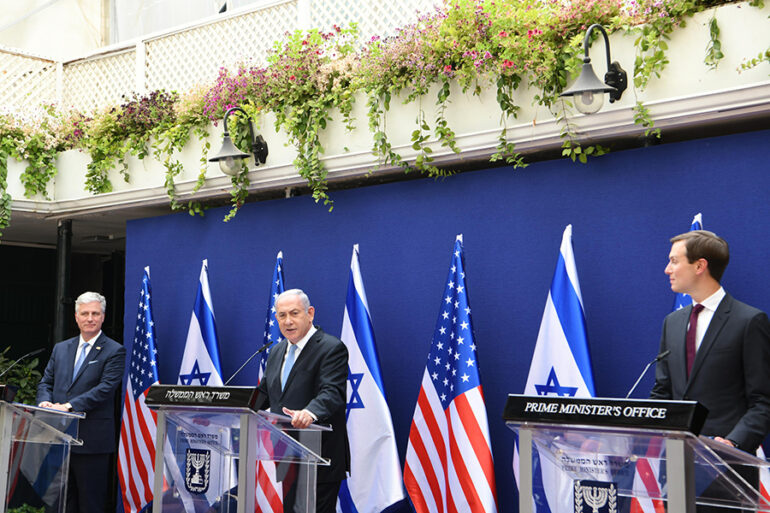United States President Donald Trump’s son-in-law/senior advisor Jared Kushner said Wednesday that his father-in-law’s Deal of the Century is an attempt to “save the two-state solution” because it prevents the Jewish presence in the West Bank from expanding.
“What we did with our plan was we were trying to save the two-state solution,” Kushner specified to reporters during a phone briefing. “If we kept going with the status quo… ultimately, Israel would have eaten up all the land in the West Bank.”
Kushner’s statement reinforced US National Security Adviser Robert O’Brien’s declaration last week that the Trump administration is “committed to a two-state solution.”
O’Brien’s comments in support of partitioning Israel into two states, each dependent on Washington for survival, were made in an interview last Thursday with Hugh Hewitt.
His remarks were also tweeted out by the US National Security Council’s official account.
Last Monday, Kushner and O’Brien were part of a joint US-Israeli delegation that visited Abu Dhabi to finalize the peace agreement between the State of Israel and the United Arab Emirates, a deal Kushner had been instrumental in brokering.
Although it was reported that Israel’s agreement with the UAE stipulated that Jerusalem suspend plans to apply full sovereignty to parts of the disputed Samaria and Judea regions, Trump had actually sent Middle East Envoy Avi Berkowitz to Israel in June to ensure Prime Minister Binyamin Netanyahu (Likud) not move forward with annexation plans for the West Bank.
The US has long demanded that Israel surrender these territories, which constitute the cradle of Jewish civilization, in order to divide the country into two separate states. Israel extending legal sovereignty to any or all parts of the West Bank would clearly challenge Washington’s regional interests.
Despite Netanyahu’s claims that the UAE agreement didn’t end his plans to apply sovereignty, Trump has repeatedly insisted that Israel agreed not to move forward with annexation as part of the deal.
This isn’t the first time Trump has publicly contradicted Netanyahu’s political statements. In fact, the Trump administration’s treatment of Israel has been unique in that it has simultaneously met the needs of Israel’s westernized conservatives and threatened the interests of ideological Jewish nationalists. Exposing the contradictions between these two groups has the potential to split the Israeli national camp.
Right-wing journalist Caroline Glick, for example, excoriated West Bank Jewish leaders last Wednesday, blaming them for the suspension of the Trump plan – a plan Glick views as beneficial for Israel.
Speaking at the B’Sheva Jerusalem Conference, Glick slammed the Yesha (Jewish Communities in Judea and Samaria) Council for its resistance to Trump’s “Deal of the Century.”
She further claimed that the umbrella organization representing West Bank Jews was responsible for inflicting political damage to Trump during a US election year and preventing Netanyahu from being able to apply sovereignty to the roughly 30% of the West Bank permitted by the Trump plan.
Binyamin Regional Council chairman Yisrael Gantz pushed back on Glick, calling the map presented by the Trump plan “dangerous” for Israel.
“Netanyahu told us that the map was only conceptual, and that it would be changed,” he said. “But from the moment that it became the actual map [for the Trump plan] we understood that this was dangerous.”
Gantz added that the State of Israel, as an independent nation, could still apply sovereignty to the territories, outside the scope of the Trump plan.
“Sovereignty is something that could be done today.”
Yesha Council Chairman David Elḥayani went further than Gantz, calling for Prime Minister Netanyahu’s replacement as head of state.
In an interview with Arutz Sheva on Wednesday, Elḥayani expressed pride in thwarting Trump’s two-state plan and accused Netanyahu of placing US interests before those of the people of Israel.
Netanyahu had attempted to reach out to nationalist opponents last Sunday during a a press conference alongside O’Brien and Kushner.
“No one will be uprooted,” Netanyahu assured Israelis concerned that the Trump administration is pressing him to surrender land and destroy Jewish communities.
“Areas of Jewish population and areas vital to Israel’s security are envisioned being incorporated to sovereign Israel, and Israel retains overriding security control in the areas west of the Jordan River, both on the ground and in the air.”
But the prime minister warned that Israel maintaining control over the disputed Samaria and Judea regions, as well as protecting its Jewish communities, would depend on Jerusalem’s acceptance of Trump’s plan, essentially regarding it as the most desirable version of the “two-state solution” presented by any US administration.
“Without Trump’s peace plan,” he said. “Israel would have to withdraw to the indefensible ’67 lines and expel more than 100,000 Jews from their homes in our own ancestral homeland.”
The Knesset’s Land of Israel Caucus responded by announcing that it had filed a bill to authorize several West Bank Jewish villages deemed illegal by the state for various reasons.
The necessity for such legislation became obvious in recent weeks when Israel’s Supreme Court ruled that the state has three years to demolish more than 30 homes in the Mitzpe Kramim community, where roughly 250 Jews currently live.
“Without authorization, Netanyahu’s promises will never be brought to fruition,” lawmakers Beztalel Smotrich (Yamina) and Ḥaim Katz (Likud), who co-chair the caucus, said in a statement.
“Trump’s plan taught us one thing: that a community that is not authorized [by the state] will find itself outside the sovereignty map.”
The caucus leaders further claimed that the fate of these small villages could be even worse than those of the isolated enclaves of larger West Bank Jewish communities in the Trump administration’s map, which Washington isn’t directly calling to destroy but is pushing for the conditions that would make life near impossible for residents.
“This is an unsustainable situation that must be immediately corrected,” the statement said.
The infighting currently taking place on what’s often superficially referred to as the Israeli political right shows the extent to which the Trump administration and its agenda for the region has exposed deep contradictions between ideological Jewish nationalists and westernized conservatives.
The conservatives, represented by public figures like Caroline Glick, Binyamin Netanyahu and a host of politicians, tend to champion neoliberal economic policies, a strong hand against Palestinians and close ties to Washington. They rank security and stability at the top of their list of priorities, see Israel’s survival as dependent on US power, praise the cultural and moral superiority of Western civilization and currently view themselves as part of some illusory new “international right” brought on by Trump’s ascension to the White House.
Ideological Jewish nationalists, by contrast, are committed to the aspirations that have driven the Jewish people since our displacement by the Roman Empire. This group wants a Jewish state that’s fully independent and deeply expressive of Jewish identity and it has demonstrated a strong idealism and willingness to sacrifice to keep the entire Land of Israel under Hebrew sovereignty.
While still a relatively small sector of the Israeli public, this group is highly motivated to contribute to Israeli society and can be credited with freeing the country from British rule in the 1940s and spearheading efforts to populate the territories won in the 1967 war. This sector also has one of the highest birthrates in the country and comprises an overwhelmingly large percentage of combat officers in Israel’s army.
While both groups have traditionally supported Israel’s claim to the territories won in 1967, the conservatives have done so more for the sake of Israel’s security needs while the nationalists come from a deep spiritual connection with the land and its history, as well as a sense that these territories are a crucial component of Israel’s identity. So while the conservatives can theoretically relinquish land under the right circumstances, assuming Israel’s security needs are met, the nationalists can’t.
Being that the Israeli conservatives are more willing to surrender territory and are for the most part comfortable being dominated by the forces of empire (so long as the emperor is sufficiently “pro-Israel”), they’ve been far more positive towards the Trump plan and are now blaming the nationalists for potentially derailing it.
While these conservatives currently hold more institutional power than the nationalists, the nationalists have more conviction, as well as an educational network throughout the country that perpetuates their values and ideology.
But for Jewish nationalists to be successful in advancing Israel’s historic aspirations forward, the camp will require a conscious understanding of the fact that right-wing conservative interests aren’t consistent with Jewish national interests, as well as a principled analysis of how real Jewish aspirations can be met given the political conditions that currently exist.





